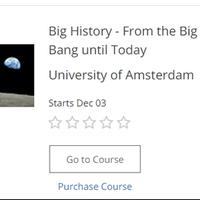1.3 Video: What are little big histories?
In this video, I will tell you a bit more about little big histories. And a little big history assignment you will have to complete in order to pass this course. Little big histories are studies in which you take a relatively small subject and link that to aspects of all major phases in big history. They allow you to explore big history in a structured and systematic way, and as a result, keep you from getting lost in the vastness of the fields. At the same time, they allow you to link things that happened a long time ago and often very far away to something that is close to you and as a result, make distant events and processes come to life. All in all, creating a little big history is a good way to get actively engaged in big history. In fact, the little big history approach was invented to help you do just that. But while developing the little big history approach, we stumbled upon aN additional advantage. While creating your little big history, you'll notice that it will be relatively easy to come up with your own new ideas simply because you probably never have heard or read about connections between a little big history subject like a cup of tea and say, Jupiter's moons, the evolution of insects or the Industrial Revolution before. Often, disciplinary boundaries discourage the creation of publications or courses that deal with such seemingly different subjects. But because big history politely disregards such disciplinary boundaries, it does allow and in fact, encourage you to think about such links and thus, provides opportunities to discover interesting new things. For example, when thinking about a connection between the cup of tea and Jupiter's moon, Europa, you may find that both partly consist out of liquid water. You may also find that liquid water cannot exist in many places in our solar system besides Europa, Earth, and a few other bodies. Why do think that is the case? In other words, what special conditions on Earth and in Europa allow for cups of tea to exist in these places? When thinking about a connection between your cup of tea and the evolution of insects, you may find that during their evolution, insects became dependent on plants for food and plants became dependent on insects for the spread of their pollen. Did insects perhaps become extra dependent on tea plants because they got a buzz from the caffeine they contained? In other words, were the addictive properties of caffeine in tea, properties many people enjoy, originally developed for bees? When thinking about a connection between tea and the Industrial Revolution, you may find that tea became very popular among British factory workers, partly because it kept them going. You may also find that the British indirectly tried to pay for their tea with opium in China. What consequences do you think this had for China? To what extent did a simple cup of tea influence the demise of the mighty Chinese empire in the 19th century? I will discuss these and many more links but more obvious and unexpected ones in more detail at the end of each module. I hope that by doing so, by the end of the course, I will have changed the way you think about the world's most popular hot drink, and will have convinced you of the potential of the little big history approach. Doing this is not the only goal of the little big history videos though. They are also meant to inspire you to create your own little big history about a subject of your choice. This subject can be anything. Over the past years, I've seen very good little big histories of things ranging from concrete objects, like a glass of beer, always popular among students, or a smartphone, to more complex concepts, like religion or general relativity. Simply pick something you're genuinely interested in and would like to learn some new things about. The little big history assignments which will be peer reviewed is the main assignment for this course. Completing the assignments, along with a number of multiple choice tests, will allow you to pass the course. But more importantly, I hope that completing the assignment will encourage you, not just to listen to what my colleges and I will tell you about big history, but also to actively start exploring the field and develop your own thoughts about big history and about a little big history subject you care about.

